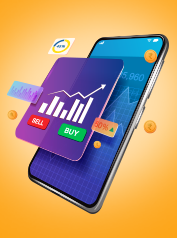Discover how to quickly and securely e-verify your Income Tax Return (ITR) on Bajaj Markets, ensuring your filing is complete.
As the deadline for filing taxes comes closer, financial advisors and CA professionals are inundated with clients seeking income tax filing services. If your annual income is higher than ₹2.5 Lakhs, you may be one among these clients.
However, it is important to note that filing your ITR within the stipulated timeline does not conclude the I-T return process. The e-verification of Income Tax Return is mandatory and must be done within 30 days of filing.
All online ITR verification is done via the e-filing portal. There are essentially two techniques you can use to execute the income tax e-verification process on the portal.
When you file your ITR online, you will receive an acknowledgement number. To continue without logging in, keep this detail handy. Once this is in place, you can visit the e-filing website homepage.
Under ‘Quick Links’, click on ‘e-Verify Return’
Enter your PAN details and choose the assessment year
Provide your acknowledgement number and an accessible mobile number
Click on continue
Enter the OTP received on your registered phone number
Now, you can complete the I-T return e-verification process.
In this method, you need to be a registered user on the e-filing portal with a valid user ID and password.
Log in on the e-filing portal
Click on the tab displaying ‘e-File’
From the drop down menu, select ‘Income Tax Returns’
Then click on ‘e-Verify Return’
On the ‘e-Verify Return’ page, click on ‘E-Verify’ to select the unverified return
Once you click on this, you will be presented with a number of options to continue with the e-verification of ITR.
After completing the e-filing process, you can opt for one of these six methods to e-verify Income Tax Return.
If you have a previously generated code, you can opt for the ‘I already have an Electronic Verification Code (EVC)’ option on the e-verification webpage. Then, enter the EVC in the adjoining textbox and follow the steps to finish the process.
Only certain banks offer a provision to e-verify ITR. For this, you need to pre-validate your bank account on the e-filing portal. On the e-Verify page, select ‘Through Bank Account.’
Click continue to receive an EVC on the mobile number and email ID registered with your bank account. Enter this in the textbox and click e-Verify to complete the process.
Similar to the bank account method, you have to pre-validate your Demat account on the portal. Then, generate the EVC by selecting ‘Through Demat account.’
Enter the EVC received on the registered mobile number and email ID in the given textbox to complete the process.
If you actively use net banking services, select the ‘Through Net Banking’ option and click continue. Then, select your bank from the dropdown list and continue to log in with your net banking account using the required details.
You will then be taken to the e-filing dashboard, where you can choose the respective ITR form and click e-Verify.
To e-verify ITR using this method, you need to first register the DSC on the income tax website. Also, it is valid only if you choose to e-verify ITR immediately after filing and not if you choose ‘e-Verify later.’
Select ‘I would like to e-Verify using Digital Signature Certificate (DSC)’, and confirm your identity. Then, select ‘Click here to download emsigner utility’. After confirming the download, click on continue and enter details such as your provider, provider password, and certificate. Then, click on the ‘Sign’ tab to finish the process.
First, ensure that your Aadhaar card is linked to your mobile number and your PAN. Then, select the option ‘I would like to verify using OTP on a mobile number registered with Aadhaar’. Then, click continue and select ‘I agree to validate my Aadhaar details’.
After generating your OTP, enter the 6-digit OTP received on your mobile number. Finally, enter the OTP and Aadhaar number and click on ‘Validate.’ This completes the process.
If you have a previously generated but valid OTP, you can e-verify ITR by choosing the option ‘I already have an OTP on Mobile number registered with Aadhaar’.
Your I-T return will be treated as an invalid return, and you will then have to file a belated return, resulting in penalty charges.
While earlier regulations mandated verification within 120 days, this has changed. The revised time limit for submission of ITR-V or e-verification is 30 days from the date of filing the ITR.
The EVC will be valid for 72 hours, after which it will expire, requiring you to generate a new one.
If you fail to verify the ITR within 30 days of filing, you will be liable to pay a fine of ₹5,000. However, if your total income is less than ₹5 Lakhs, you need to pay only ₹1,000.
If you are unable to e-Verify ITR, there is another way to do so physically, i.e. by using a bank ATM. Here, you can generate an EVC using your ATM card and receive it on your registered mobile number and email.
You can then use the ‘I already have an Electronic Verification Code (EVC)’ option on the e-verification webpage to complete verification. Send a signed copy of the ITR-V to the Centralised Processing Centre (CPC) of the I-T department.
No, you need to register your contact number with your Aadhaar to carry out the e-verification of ITR.
In this case, you must assess the reason for the same on your e-Filing Dashboard. You can choose to send another ITR-V or e-verify the ITR online.












